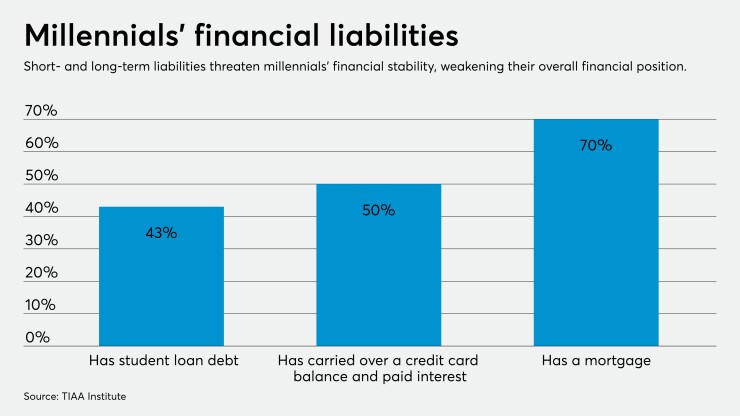Out of all generations in the workplace, millennials are struggling the most when it comes to their finances, due to high student loan debt and lack of savings, according to a new study.
Thirty seven percent of millennials would not be able to come up with $2,000 in 30 days, compared to 34% of Gen X and 23% of baby boomers, according to the report by the TIAA Institute and the George Washington University’s Global Financial Literacy Excellence Center (GFLEC). Millennials tend to rely more heavily on debt and engage more frequently in expensive short- and long-term money management behaviors to deal with financial shortfalls. They also display lower financial literacy than older working-age adults, the study finds.
“Millennials’ precarious financial situations combined with their low level of financial literacy can put their financial wellbeing at risk,” says Annamaria Lusardi, academic director of GFLEC. “This is why employer-sponsored financial education becomes critical in helping them obtain a financially secure future. The more these programs are tailored to specific individual needs and financial situations, the more effective they will be.”
See also:
Millennials are forecast to make up 50% of the workforce in 2020, and employers need to tailor benefits that will improve their financial literacy and financial well-being, Lusardi says.
A financial check-up can reveal financial pain points, tailored to their specific financial needs and circumstances. This individualized approach can help employees manage both assets and debt, as well as build short- and long-term savings. Using simple, personalized language and a step-by-step action plan improves engagement and affects behavioral change.
“As one of the largest and most highly educated generations, millennials play an increasingly pivotal role in our economy,” says Stephanie Bell-Rose, head of the TIAA Institute. “The results of this study are a wakeup call to employers, financial institutions, and anyone else who is concerned about improving economic outcomes and supporting the younger workforce through financial education.”






